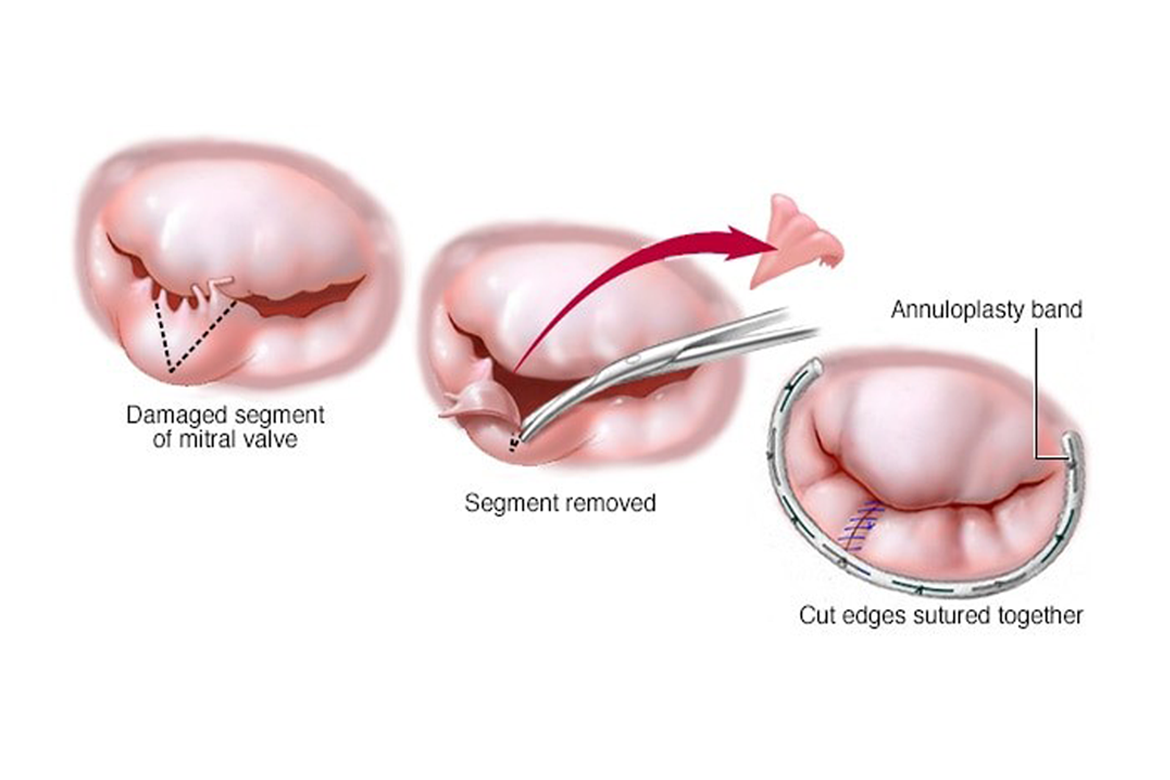 Mitral valve repair and mitral valve replacement
Mitral valve repair and mitral valve replacement
Overview
Mitral valve repair and mitral valve replacement are procedures that may be performed to treat diseases of the mitral valve — the valve located between the left heart chambers (left atrium and left ventricle).
Several types of mitral valve disease exist. In mitral valve regurgitation, the flaps (leaflets) of the mitral valve don't close tightly, causing blood to leak backward into the left atrium. This commonly occurs due to valve leaflets bulging back — a condition called mitral valve prolapse.
In another condition, called mitral valve stenosis, the leaflets become thick or stiff, and they may fuse together. This results in a narrowed valve opening and reduced blood flow through the valve.
Treatment for mitral valve disease depends on the severity of your condition. Doctors may recommend surgery to repair or replace mitral valves for some people with mitral valve disease. Several surgical procedures exist to repair or replace mitral valves, including open-heart surgery or minimally invasive heart surgery.
Mitral valve disease treatment depends on how severe your condition is, if you're experiencing signs and symptoms, and if your condition is getting worse.
Your doctor and treatment team may evaluate you to determine the most appropriate treatment for your condition. In an evaluation, your doctor may conduct a physical examination, review your medical history and perform tests.
Your doctor may first suggest monitoring your condition with regular evaluations if you're not experiencing symptoms or your condition is mild. You may be prescribed medications to manage symptoms. If your condition is mild, you may not need surgery.
However, your mitral valve may eventually need to be repaired or replaced. In some cases, doctors may recommend mitral valve repair or mitral valve replacement even if you're not experiencing symptoms. Research has found that performing surgery in a person with severe mitral valve regurgitation who isn't experiencing symptoms, rather than monitoring the condition, can improve long-term outcomes.
If you need heart surgery for another condition in addition to mitral valve disease, doctors may conduct surgery to treat both conditions at the same time.
Your doctor will discuss with you whether mitral valve repair or mitral valve replacement may be most appropriate for your condition. Doctors often may recommend mitral valve repair. However, if mitral valve repair isn't possible, doctors may need to perform mitral valve replacement. Doctors may also evaluate whether you're a candidate for minimally invasive heart surgery or open-heart surgery.
Mitral valve repair surgery should generally be performed at a medical center with staff that has experience in performing mitral valve repair surgery and that has conducted high volumes of mitral valve repair surgeries.
Mitral valve repair and mitral valve replacement surgery can involve risks including:
- Bleeding
- Blood clots
- Valve dysfunction in replacement valve
- Heart rhythm problems
- Infection
- Stroke
- Death
Before surgery to have your mitral valve repaired or replaced, your doctor and treatment team will explain to you what to expect before, during and after the surgery and potential risks of the surgery.
Your doctor and team will discuss concerns you may have about your mitral valve repair or mitral valve replacement surgery. Discuss with your doctor and treatment team any questions you may have about the procedure.
You'll need to have your hair shaved off at the location of your body where the procedure will take place.
Before being admitted to the hospital for your surgery, talk to your family about your hospital stay and discuss help you may need when you return home. Your doctor and treatment team may give you specific instructions to follow during your recovery when you return home.
Food and medications:
- When you can take your regular medications and whether you can take them before your surgery.
- When you should stop eating or drinking the night before the surgery
Talk to your doctor about:
Clothing and personal items
- A list of your medications.
- Eyeglasses, hearing aids or dentures.
- Personal care items, such as a brush, comb, shaving equipment and toothbrush
- Loosefitting, comfortable clothing
- A copy of your advance directive
- Items that may help you relax, such as portable music players or books During surgery, avoid wearing:
- Jewelry
- Eyeglasses
- Contact lenses
- Dentures
- Nail polish
Your treatment team may recommend that you bring several items to the hospital including:
Precautions regarding medications and allergies
- Any medications you have brought to the hospital and when you should take medications on the day of the procedure.
- Allergies or reactions you have had to medications.
Talk to your doctor about:
What you can expect:
If you have heart valve disease, you may eventually need mitral valve repair or mitral valve replacement surgery to treat your condition.
Your doctor may often recommend mitral valve repair if possible, as it preserves your mitral valve and may preserve heart function. Having your mitral valve repaired may also help you to avoid complications that can occur with mitral valve replacement, such as the risk of blood clots with mechanical valves and the risk of biological tissue valves failing over time.
During the procedure:
. You'll receive anesthetics, and you may be unconscious during the procedure. You'll be connected to a heart-lung bypass machine, which keeps blood moving through your body during the procedure.
- Mitral valve repair surgery may include patching holes in a valve, reconnecting valve leaflets, removing excess valve tissue so that the leaflets can close tightly, replacing cords that support the valve to repair the structural support, and separating valve leaflets that have fused. Surgeons often may tighten or reinforce the ring around the valve (annulus) in a procedure called an annuloplasty..
- Doctors may perform certain mitral valve repair procedures using a long, thin tube (catheter) and clips or other devices.
- In one catheter procedure, doctors insert a catheter with a clip attached in an artery in the groin and guide it to the mitral valve. Doctors use the clip to reshape the mitral valve. People who have severe symptoms of mitral valve regurgitation and who aren't candidates for surgery or who have high surgical risk may be considered for this procedure.
- Doctors may also use a catheter procedure to insert a device to plug leaks in a leaking replacement mitral valve that previously has been implanted to replace the mitral valve.
- A mitral valve with a narrowed opening may also be treated with a catheter procedure called a balloon valvuloplasty. In this procedure, a doctor inserts a catheter with a balloon on the tip into an artery in your arm or groin and guides it to the mitral valve. A doctor then inflates the balloon, which expands the opening of the mitral valve. The balloon is then deflated, and the catheter and balloon are removed.
Mitral valve repair:
Mitral valve replacement
If your mitral valve can't be repaired, your doctor may recommend mitral valve replacement. In this procedure, your doctor removes the mitral valve and replaces it with a mechanical valve or a valve made from cow, pig or human heart tissue (biological tissue valve).
Biological tissue valves often eventually need to be replaced, as they degenerate over time. If you have a mechanical valve, you'll need to take blood-thinning medications for the rest of your life to prevent blood clots. Doctors will discuss with you the risks and benefits of each type of valve and discuss which valve may be appropriate for you.
When possible, doctors may preserve the cords supporting the valve during the procedure, in order to preserve as much of the heart's function as possible.
In some cases, a catheter procedure may be conducted to insert a replacement valve in a biological tissue valve in the heart that is no longer working properly.
Some doctors are also studying using catheter procedures to replace a mitral valve that is no longer working properly, and some medical centers may offer this procedure as part of clinical trials for people with severe mitral valve disease who aren't candidates for surgery.
After the procedure:
You'll generally spend a day or more in the intensive care unit (ICU). You'll be given fluids, nutrition and medications through intravenous (IV) lines. Other tubes will drain urine from your bladder and drain fluid and blood from your heart and chest. You may be given oxygen.
After the ICU, you'll be moved to a regular hospital room for several days. The time you spend in the ICU and hospital can vary, depending on your condition and the type of surgery you had.
Your treatment team may monitor your condition and watch for signs of infection in your incision sites. Your team may check your blood pressure, breathing and heart rate. Your treatment team will also work with you to manage pain you may experience after surgery.
Your treatment team may instruct you to walk regularly to gradually increase your activity and to do breathing exercises as you recover.
Your doctor may give you instructions to follow during your recovery, such as watching for signs of infection in your incisions, properly caring for incisions, taking medications, and managing pain and other side effects after your surgery.
After mitral valve repair or mitral valve replacement surgery, you may be able to return to daily activities, such as working, driving and exercise. Your doctor will discuss with you when you can return to activities. You'll generally still need to take certain medications.
You'll need to attend regular follow-up appointments with your doctor. You may have several tests to evaluate and monitor your condition.
Your doctor may instruct you to incorporate healthy lifestyle changes — such as physical activity, a healthy diet, stress management and avoiding tobacco use — into your life.
Your doctor may recommend that you participate in cardiac rehabilitation — a program of education and exercise designed to help you improve your health and help you recover after heart surgery.
